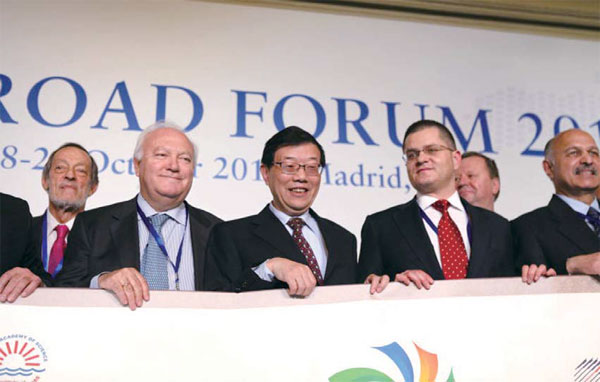Belt and Road to build 'new world order'
Updated: 2015-10-30 07:33
By Cecily Liu in Madrid(China Daily Europe)
|
|||||||||||
Top expert says China's initiative can also create complementary governance structure
China's Belt and Road Initiative will play a crucial role in facilitating the global economic recovery, connecting international markets and forming a new order for world development, says Li Wei, president of the State Council's Development Research Center.
At the two-day Silk Road Forum in Madrid, which began on Oct 27 and was attended by more than 200 politicians, businesspeople and scholars from 30 countries, Li expounded on the importance of the Belt and Road Initiative and added that the international community has reacted with interest since China introduced the ambitious proposal.
|
Li Wei (center), president of the State Council's Development Research Center, at the Silk Road Forum in Madrid. Tuo Yannan / China Daily |
There are, however, major concerns, Li added, especially considering that the project will involve many countries at different stages of development and with different cultural backgrounds, interests and aspirations. Still, he explained that the grand vision can be achieved.
The forum is in its second session following the inaugural summit in Istanbul in December.
In his keynote speech, Li said the initiative, by strengthening communication about policies and deepening economic cooperation, will help the global economy recover more quickly from the 2008 financial crisis.
He added that the integration resulting from regional cooperation can resolve structural challenges in the global economy. Through collaboration and increased market connectivity, countries will be able to fulfill their growth potential, fully utilize comparative advantages and optimize their economic structure.
The new direction can facilitate a new world order and governance structure to complement the existing global governance system, represented by multinational institutions like the United Nations, the World Trade Organization, the World Bank and the International Monetary Fund. This new order will be reflective of the needs of the world today, he said.
The forum is hosted by the Development Research Center in China, Serbia's Center for International Relations and Sustainable Development and the Chinese embassy in Spain.
One important milestone reached at the forum is the launch of the Silk Road Think Tank Network, which currently has 43 confirmed founding members from 27 countries, including think tanks from both China and abroad.
Academia and think tanks can play a role in thinking critically about the implications of the Belt and Road Initiative and enhance dialogue and understanding about these developments in different societies, says Tim Summers, a senior consulting fellow at Chatham House, a London-based think tank.
Zhang Ying, associate dean of the Rotterdam School of Management at Erasmus University, shared Summers' sentiment and added that think tanks will help Chinese businesses collaborate with other countries along the Belt and Road in a much smoother way.
"The network and alliances within academia have already paved the way for business at an institutional and intellectual level."
Rana Mitter, a professor of the history and politics of modern China at Oxford University, says academic input into the initiative will be important, especially in building a cultural bridge for different players.
"There will need to be a whole variety of cultural initiatives to go with the economics. The fact is that the Silk Road cultures - Iran, China, Central Asia - don't know each other very well and need to learn more about each other's cultures and languages," Mitter says.
Shaun Breslin, a professor of politics and international studies at Warwick University, says a lot of work needs to be done to allow China's international partners to buy into its vision of the Belt and Road Initiative, which is where the academic field becomes important.
The initiative is not just about basic objectives like roads, railways and trade, it is about the building of a community with a unified vision, he says.
"There is a lot of work to be done: fleshing out the vision, communicating it to others and getting them to buy in."
cecily.liu@mail.chinadailyuk.com
(China Daily European Weekly 10/30/2015 page19)
Today's Top News
China to allow two children for all couples
China's central bank dismisses QE rumor
Chinese premier holds talks with German chancellor
Refugee crisis continues to create rift between pro-Europeans, Eurosceptics
Rescue operations continue in quake-stricken Afghan provinces
Dutch King receives Dutch rabbit with Chinese characteristics
Silk Road Fund to invest $100m in China International Capital Corp's IPO
Over 200 dead as huge earthquake shakes S. Asia
Hot Topics
Lunar probe , China growth forecasts, Emission rules get tougher, China seen through 'colored lens', International board,
Editor's Picks

|

|

|

|

|

|







